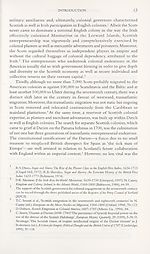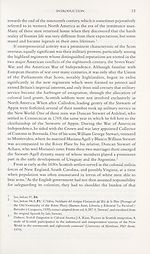Series 5 > Scotland and the Americas, c. 1650 - c. 1939
(33) Page 14
Download files
Complete book:
Individual page:
Thumbnail gallery: Grid view | List view

14
SCOTLAND AND THE AMERICAS
colonial expertise brought to bear on the debates on union in the
concluding session of the Scottish Estates in 1706-7. Arguably, the
understated importance of Scottish entrepreneurial engagement in empire
ensured that the making of union involved issues of principle on both
sides—not just among the opponents of political incorporation and
political jobbery. At the same time, entrepreneurial engagement in empire
can be deemed to rehabilitate the importance of political economy as
that of sophisticated political management in effecting the United
Kingdom of Great Britain.1
The Union of 1707 provided the springboard for enterprising
sojourners and settlers to pursue effectively and legally transatlantic
imperial opportunities from the Arctic to the Caribbean, not least in the
Chesapeake tobacco trade, which was so central to Glasgow’s rise to
prominence as the second city of the empire.2 Further south, middle-
class Scots followed a diversity of occupations in the Caribbean, where
they were engaged not only as slave-owning merchant-planters and estate
managers for absentee owners, but also as doctors and lawyers.3 Meanwhile,
in more northerly latitudes, Scots were also being attracted in droves to
the Canadian fur trade, which they continued to dominate after the merger
of the Northwest Company and Hudson’s Bay Company in 1821, at the
same time as they took control of eastern Canada’s burgeoning export
trade in timber.4
The solid eighteenth-century and early nineteenth-century
foundations of Scottish enterprise were then confirmed and expanded by
a variety ofVictorian and Edwardian ventures and by an ongoing quest
for economic betterment across the Atlantic between the wars. Brewers,
detectives, explorers, gold miners, Indian traders, ranchers, industrialists,
politicians and philanthropists all reinforced the enduring image of the
Scot abroad as the epitome of shrewd, clannish, and disproportionately
successful business practice. The name of Andrew Carnegie in particular
became a familiar byword for successful enterprise5 while in a smaller
way Andrew Little, the Moffat-born‘Sheep King of Idaho’, was a celebrated
figure among the sheep farmers and shepherds of the western United
States.6 Some Scottish adventurers were also notable eccentrics, especially
1 A.M. Carstairs, ‘Some economic aspects of the Union of Parliaments’, Scottish Journal of
Political Economy, 2 (1955), 64-72;T.C. Smout,‘The road to Union’ in G. Holmes (ed.), Britain
after the Glorious Revolution, 1689-1714 (London, 1969), 176-96; C.A. Whatley, ‘Bought and
Sold for English Gold’? Explaining the Union of 1707 (Glasgow, 1994).
2 See, below, 81, C2.
3 See, below, 75-7, Bl-2; 260-1,B4.
4 See, below, 83, D2.
5 See, below, 89-90, E4.
6 L. Shadduck, Andy Little: Idaho Sheep King (Caldwell, 1990); Szasz, Scots in the American West.
We are grateful to Professor Szasz for drawing our attention to Litde’s biography.
SCOTLAND AND THE AMERICAS
colonial expertise brought to bear on the debates on union in the
concluding session of the Scottish Estates in 1706-7. Arguably, the
understated importance of Scottish entrepreneurial engagement in empire
ensured that the making of union involved issues of principle on both
sides—not just among the opponents of political incorporation and
political jobbery. At the same time, entrepreneurial engagement in empire
can be deemed to rehabilitate the importance of political economy as
that of sophisticated political management in effecting the United
Kingdom of Great Britain.1
The Union of 1707 provided the springboard for enterprising
sojourners and settlers to pursue effectively and legally transatlantic
imperial opportunities from the Arctic to the Caribbean, not least in the
Chesapeake tobacco trade, which was so central to Glasgow’s rise to
prominence as the second city of the empire.2 Further south, middle-
class Scots followed a diversity of occupations in the Caribbean, where
they were engaged not only as slave-owning merchant-planters and estate
managers for absentee owners, but also as doctors and lawyers.3 Meanwhile,
in more northerly latitudes, Scots were also being attracted in droves to
the Canadian fur trade, which they continued to dominate after the merger
of the Northwest Company and Hudson’s Bay Company in 1821, at the
same time as they took control of eastern Canada’s burgeoning export
trade in timber.4
The solid eighteenth-century and early nineteenth-century
foundations of Scottish enterprise were then confirmed and expanded by
a variety ofVictorian and Edwardian ventures and by an ongoing quest
for economic betterment across the Atlantic between the wars. Brewers,
detectives, explorers, gold miners, Indian traders, ranchers, industrialists,
politicians and philanthropists all reinforced the enduring image of the
Scot abroad as the epitome of shrewd, clannish, and disproportionately
successful business practice. The name of Andrew Carnegie in particular
became a familiar byword for successful enterprise5 while in a smaller
way Andrew Little, the Moffat-born‘Sheep King of Idaho’, was a celebrated
figure among the sheep farmers and shepherds of the western United
States.6 Some Scottish adventurers were also notable eccentrics, especially
1 A.M. Carstairs, ‘Some economic aspects of the Union of Parliaments’, Scottish Journal of
Political Economy, 2 (1955), 64-72;T.C. Smout,‘The road to Union’ in G. Holmes (ed.), Britain
after the Glorious Revolution, 1689-1714 (London, 1969), 176-96; C.A. Whatley, ‘Bought and
Sold for English Gold’? Explaining the Union of 1707 (Glasgow, 1994).
2 See, below, 81, C2.
3 See, below, 75-7, Bl-2; 260-1,B4.
4 See, below, 83, D2.
5 See, below, 89-90, E4.
6 L. Shadduck, Andy Little: Idaho Sheep King (Caldwell, 1990); Szasz, Scots in the American West.
We are grateful to Professor Szasz for drawing our attention to Litde’s biography.
Set display mode to:
![]() Universal Viewer |
Universal Viewer | ![]() Mirador |
Large image | Transcription
Mirador |
Large image | Transcription
Images and transcriptions on this page, including medium image downloads, may be used under the Creative Commons Attribution 4.0 International Licence unless otherwise stated. ![]()
| Scottish History Society volumes > Series 5 > Scotland and the Americas, c. 1650 - c. 1939 > (33) Page 14 |
|---|
| Permanent URL | https://digital.nls.uk/127324269 |
|---|
| Description | Over 180 volumes, published by the Scottish History Society, containing original sources on Scotland's history and people. With a wide range of subjects, the books collectively cover all periods from the 12th to 20th centuries, and reflect changing trends in Scottish history. Sources are accompanied by scholarly interpretation, references and bibliographies. Volumes are usually published annually, and more digitised volumes will be added as they become available. |
|---|


